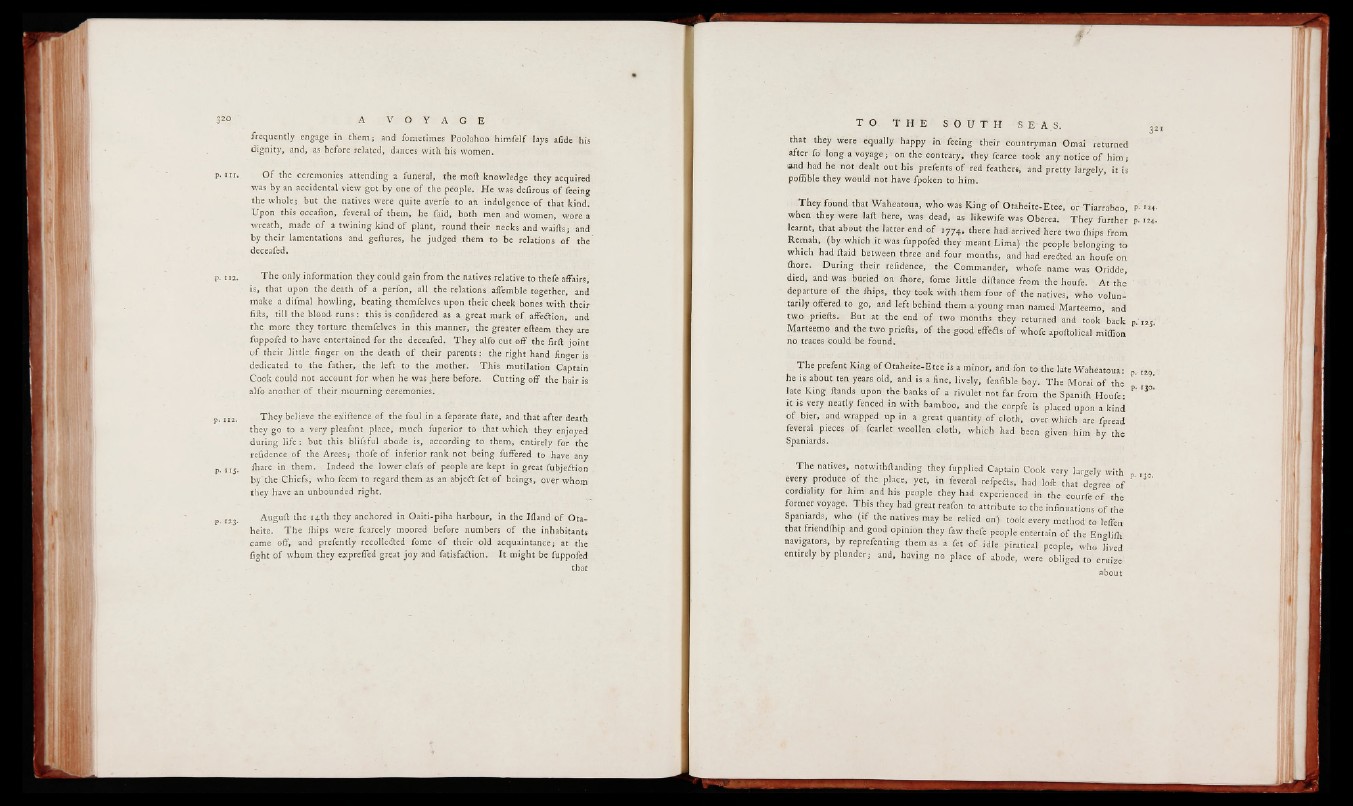
frequently engage in them; and fometimes Poolahoo. himfelf lays afide his
dignity, and, as before related, dances with his women.
p . h i . O f the ceremonies attending a funeral, the moft knowledge they acquired
was by an accidental view got by one of the people, He was defirous of feeing
the whole; but the natives were quite averfe to ah indulgence of that kind.
Upon this occaiion, ieveral of them, he faid, both men and women, wore a
wreath, made of a twining kind of plant, round their necks and waifts; and
by their lamentations and geftures, he judged them to be relations of the
deceafed.
p. ii2. The only information they could gain from the natives relative to thefe affairs
is, that upon the death of a perfon, all the relations affemble together, and
make a difmal howling, beating themfelves upon their cheek bones with their
fifts, till the blood runs: this is confidered as a great mark of affedtion and
the more they torture themfelves in this manner, the greater efteem they are
fuppofed to have entertained for the deceafed. They alfo cut off the firil joint
o f their little finger on the death of their parents: the right hand finger is
dedicated to the father, the left to the mother. This mutilation Captain
Cook could not account for when he was 0here before. Cutting off the hair is
alfo another of their mourning ceremonies.
p. 112. They believe the exiftence of the foul in a feparate ftate, and that after death
they go to a very pleafant place, much fuperior to that which they enjoyed
during life : but this blifsful abode is, according to them, entirely for the
refidence of the Arees; thofe of inferior rank not being fuffered to have any
p. 115. fhare in them. Indeed the lower clafs of people are kept in great fubjedtion
by" the Chiefs, who feem to regard them as an abjedt fet of beings, over whom
they have an unbounded right.
p 123. Auguft the 14th they anchored in Oaiti-piha harbour, in the Iiiand o f Ota-
heite. The ihips were fcarcely moored before numbers of the. inhabitants
came off, and prefently recolledted fome of their old acquaintance; at the
fight of whom they expreffed great joy and fatisfadtion. It might be fuppofed
that
that they were equally happy in feeing their countryman Omai returned
after fo long a voyage; on the contrary, they fcarce took any notice of him;
and had he not dealt out his prefents of red feathers, and pretty largely, it is
poffible they would not have fpoken to him.
They found that Waheatoua, who was King of Otaheite-Etee, or Tiarraboo, g S
when they were laft here, was dead, as likewife was Oberea, They further p. 124.
learnt, that about the latter end of 1774, there had arrived here two (hips from
Remah, (by which it was fuppofed they meant Lima) the people belonging to
which had Raid between three and four months, and had ereaed an houfe on
Ihore. During their refidence, the Commander, whofe name was Oridde,
died, and was buried on Ihore, fome little diftance from the houfe. At the
departure of the Ihips, they took with them four of the natives, who voluntarily
offered to go, and left behind them a young man named Marteemo, and
two pnefts. But at the end of two months they returned and took back P i2J
Marteemo and the. two priefts, of the good effeds of whofe apoftolical miffion
no traces could be found.
The prefent King of Otaheite-Etee is a minor, and fon to the late Waheatoua: p.-tio •
he is about ten years old, and,is a fine, lively, fenfible boy. The Morai of the
late King ftands upon the banks of a rivulet not far from the Spanilh.Houfe: ' 3°'
it is very neatly fenced in with- bamboo, and the corpfe is placed upon a kind
of bier, and wrapped up in a great quantity o f cloth, over which are fpread
feveral pieces o f fcarlet woollen cloth, which had been given him by the
Spaniards.
The natives, notwithftanding they fupplied Captain Cook very largely with
every produce of the. place, yet, in feveral pefpeas', had loft that degree of 3°'
cordiality for him. and his people they had experienced in the courfe of the
former voyage. This they had great reafon to attribute to the infinuations o f the
Spaniards, who (if the natives may be relied on) took every method fo leflen
that fnendlhip and good opinion they faw thefe people entertain of the Engliili
navigators, by reprefenting them as a fet of idle piratical people, who lived
entirely by plunder; and, having no place of abode, were obliged to cruize
about